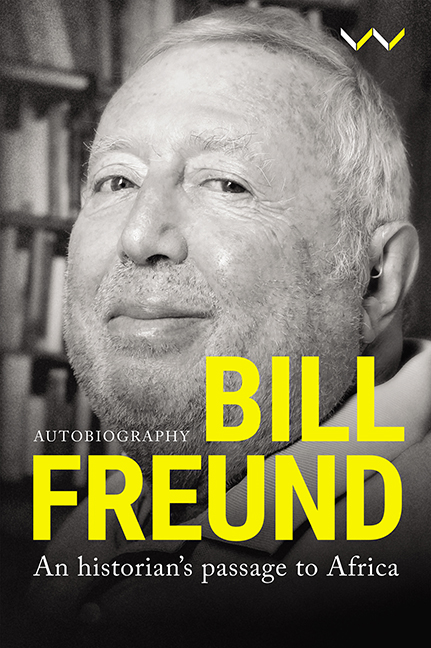Book contents
- Frontmatter
- Contents
- Foreword: Bill Freund and the Making of His Autobiography
- Family Tree
- A Brief Introduction
- 1 The Austrian Past
- 2 The Aftermath of War: A Perilous Modernity
- 3 The Dark Years
- 4 A New Life in America
- 5 Adolescence: First Bridge to a Wider World
- 6 As a Student: Chicago and Yale
- 7 As a Student: Africa and England
- 8 The Tough Years Begin
- 9 An Intellectual and an African: Nigeria
- 10 An Intellectual and an African: Dar es Salaam and Harvard
- 11 South Africa, My Home
- Notes
- Select Bibliography of Bill Freund’s Publications
- List of Illustrations
- Author’s Acknowledgements
- Supplementary Acknowledgements
- Index
5 - Adolescence: First Bridge to a Wider World
Published online by Cambridge University Press: 15 June 2021
- Frontmatter
- Contents
- Foreword: Bill Freund and the Making of His Autobiography
- Family Tree
- A Brief Introduction
- 1 The Austrian Past
- 2 The Aftermath of War: A Perilous Modernity
- 3 The Dark Years
- 4 A New Life in America
- 5 Adolescence: First Bridge to a Wider World
- 6 As a Student: Chicago and Yale
- 7 As a Student: Africa and England
- 8 The Tough Years Begin
- 9 An Intellectual and an African: Nigeria
- 10 An Intellectual and an African: Dar es Salaam and Harvard
- 11 South Africa, My Home
- Notes
- Select Bibliography of Bill Freund’s Publications
- List of Illustrations
- Author’s Acknowledgements
- Supplementary Acknowledgements
- Index
Summary
Adolescence is, of course, the time when you discover sex. The remarkable thing is that I didn’t. A very sharp memory of mine concerns my second-grade teacher, Mrs Kauffman, who didn't much like me. I remember the little girls running about and giggling that Shirley Kauffman was going to have a baby. Clever as I was, I had no idea what they were talking about. How was this possible? I was fascinated that they could know such a thing. I no longer believed that babies were delivered by storks or were for sale at the department store, but I had also just never taken any interest in such matters. Then years later my mother gave me booklets that explained clinically what sex was and how babies were made. It sounded like a little operation in the hospital. I was astonished and laughed at myself: so that's how they knew. But I can't say this sex sounded like fun.
A big internal shift in me at this age did concern gender. Up to this point, my poor relations with my father and my close relations with my mother had led me primarily to identify myself with females. Now this changed, although I remained very timid and intimidated by anything that sniffed like machismo. In my secret imagination, I was the conquering hero. I didn't get on better with my father, worse if anything, but in fact the distance from my mother grew and in particular I confided less and less in her. This coincided with the shift to high school.
The break between elementary school and high school was a big one. The old Chicago school system lacked junior high schools. You remained in elementary school for eight years although there was some specialisation in the final year. Then at age thirteen to fourteen, you progressed to a large public high school. In my case, this was in the year 1958.
Months before, the Russians had sent a satellite into orbit – Sputnik. This caused a panic in a wide array of US circles. What if American science lost its lead? What about the slack, relaxed way school teaching progressed in all too many schools? By this point in time, US schools were being subjected to considerable ‘objective’ testing procedures intended to determine our learning capacity.
.
- Type
- Chapter
- Information
- Bill FreundAn Historian's Passage to Africa, pp. 63 - 72Publisher: Wits University PressPrint publication year: 2021



